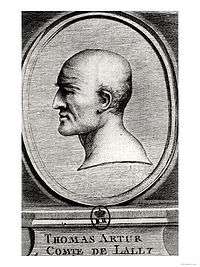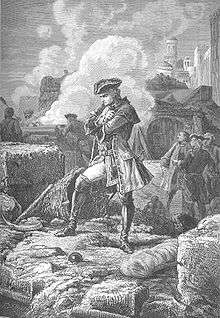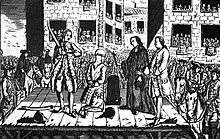Thomas Arthur, comte de Lally


Thomas Arthur, comte de Lally, baron de Tollendal (13 January 1702 – 9 May 1766) was a French General of Irish Jacobite ancestry. Lally commanded French forces, including two battalions of his own red-coated Regiment of Lally of the Irish Brigade, in India during the Seven Years' War. After a failed attempt to capture Madras he lost the Battle of Wandiwash to British forces under Eyre Coote and then was forced to surrender the remaining French post at Pondicherry. After a time spent as a prisoner of war in Britain, Lally voluntarily returned to France to face charges where he was beheaded for his alleged failures in India. Ultimately the jealousies and disloyalties of other officers, together with insufficient resources and limited naval support prevented Lally from securing India for France. In 1778, he was publicly exonerated by Louis XVI of his alleged crime.
Life
He was born at Romans-sur-Isère, Dauphiné, the son of Sir Gerald Lally, an Irish Jacobite from Tuam, County Galway, who married a French lady of noble family. His title is derived from the Lally's ancestral home, Castel Tullendally in Co. Galway where the Lally's (originally called O'Mullallys) were prominent members of the Gaelic Aristocracy who could trace their ancestry back to the second century High King of Ireland, 'Conn of the Hundred battles.'
Entering the French army in 1721 he served in the war of 1734 against Austria; he was present at Dettingen (1743), and commanded the regiment de Lally in the famous Irish brigade at Fontenoy (May 1745). He was made a brigadier on the field by Louis XV.
He was a staunch Jacobite and in 1745 accompanied Charles Edward to Scotland, serving as aide-de-camp at the battle of Falkirk (January 1746). Escaping to France, he served with Marshal Saxe in the Low Countries, and at the capture of Maastricht (1748) was made a maréchal de camp.
When war broke out with Britain in 1756 Lally was appointed governor-general of French India and commanded a French expedition, made up of four battalions, of whom two were from his own Regiment of Lally of the Irish Brigade, to India. He reached Pondicherry in April 1758, and within six weeks had pushed the British back from the coast to Madras (in modern-day Chennai), the headquarters of the English East India Company.
He was a man of courage and a capable general; but his pride and ferocity made him unpopular with his officers and men. He was unsuccessful in an attack on Tanjore, and as he lacked French naval support he had to retire from the Siege of Madras (1758) owing to the timely arrival of the British fleet. He was defeated by Sir Eyre Coote at the Battle of Wandiwash (1760), and besieged in Pondicherry, where he was forced to capitulate in 1761.[1]
Trial and execution

Lally was sent as a prisoner of war to England. Public opinion in France was very hostile, blaming him for the defeat by the British, and there were widespread calls for Lally to be put on trial.[2] While in London, he heard that he was accused in France of treason, and insisted, against advice, on returning on parole to stand trial.[3] He was kept prisoner for nearly two years before the trial began in 1764 and when the Advocate General of the Paris Parlement Joly de Fleury began the prosecution, Lally had not received any documentation of the charges, and was not allowed a defence lawyer. Throughout the trial, which lasted for two years, Lally fought against Joly de Fleury’s charges but on 6 May 1766 he was convicted and sentenced to death.[4]
Lally made an unsuccessful attempt at suicide in prison after his sentencing, but three days after his conviction, he was gagged to prevent him from protesting his innocence further, and transported in a garbage cart to be beheaded at the Place de Grève. The executioner's first blow only sliced open his skull, and it took a second to kill him.[5]
Voltaire's efforts at rehabilitation
Voltaire knew Lally personally, and had no liking for him. As he had investments in the East India Company, he was concerned 'this Irish hothead' might not be good for the shareholders when he was sent out to India.[6] When he heard of his execution, he wrote to one friend 'I knew Lally-Tollendal for an absurd man, violent, ambitious, capable of pillage and abuse of power; but I should be astonished if he was a traitor' and to another he wrote 'I have just been reading up on the tragedy of poor Lally. I can easily see that Lally got himself detested by all the officers and all the inhabitants of Pondicherry, but in all the submissions to the trial there is no appearance of embezzlement, nor of treason.' [7] Voltaire had taken up a number of campaigns against miscarriages of justice, most famously that of Jean Calas. His work to expose injustice and abuse of process was often hindered by the unwillingness of the courts and other authorities to release evidence, statements, and court records. In this case too, although Voltaire wanted to investigate further, he was unable to penetrate the institutional secrecy of the court for the time being.
Voltaire was able to take no further action until in 1770 he was approached for help, by Lally's natural son Gérard de Lally-Tollendal. There is an account that the shame of military failure was originally so great that this son was brought up in total ignorance of who his father had been, and only inadvertently discovered the truth of his background at the age of fifteen.[8] However this account cannot be true, as the son was fifteen when his father was executed, so his origins must have been concealed for other reasons. Voltaire offered what assistance he could, but the campaign to release the court documents was painfully slow.
Louis XV tried to throw the responsibility for what was undoubtedly a judicial murder on his ministers and the public, but his policy needed a scapegoat, and he was probably well content not to exercise his authority to save an almost friendless foreigner. The family records of his executioner stated that, while the charge of treason was clearly baseless, those of abuse of power, violence against the administrators of the colony and his soldiers, and cruelty to the natives, had ample witnesses. Lally had so impeached his officers and administrators of the colony that they could only feel safe by his condemnation and death.[9]
When Louis XVI came to the throne in 1774 there was more inclination towards clemency. Still it took discussion in thirty-two sessions before, in 1778, the Royal Council agreed to annul the proceedings against Lally, though the case still had to be referred to the Parlement of Rouen for formal overturning.[10] On 24 May 1778, less than a week before he died, Voltaire learned that Gérard de Lally-Tollendal had been given leave to appeal. Deeply moved, Voltaire wrote to him 'The dying man has been revived by learning this great news; he embraces M. de Lally very tenderly; he sees that the king is the defender of justice. He will die content.' It was the last letter he wrote.[11]
The sentence was not overturned until 1781, and the conviction itself was never cleared.
When the case was considered by the Parlement de Paris. The orator d'Eprémesnil acted as spokesman of Parlement and refused to consider any repentance.
See GB Malleson, The Career of Count Lally (1865); "Z's" (the marquis de Lally-Tollendal) article in the Biographie Michaud; and Voltaire's Œuvres complètes. The legal documents are preserved in the Bibliothèque Nationale.
See also
References
- ↑ Naravane, M.S. (2014). Battles of the Honourable East India Company. A.P.H. Publishing Corporation. p. 159. ISBN 9788131300343.
- ↑ Davidson,Ian, Voltaire, A Life, Profile Books, London 2010 p.359
- ↑ Davidson,Ian, Voltaire, A Life, Profile Books, London 2010 p.359
- ↑ Davidson,Ian, Voltaire, A Life, Profile Books, London 2010 p.359
- ↑ Davidson,Ian, Voltaire, A Life, Profile Books, London 2010 p.359
- ↑ Davidson,Ian, Voltaire, A Life, Profile Books, London 2010 p.358
- ↑ Davidson,Ian, Voltaire, A Life, Profile Books, London 2010 p.360
- ↑ Citizens, Simon Schama, Penguin, 1989 pp.31-32
- ↑ Memoirs of the Sansons, from private notes and documents, 1688-1847 / edited by Henry Sanson. https://archive.org/stream/memoirsofsansons00sansuoft/memoirsofsansons00sansuoft_djvu.txt accessed 20 April 2016
- ↑ Citizens, Simon Schama, Penguin 1989 p.32
- ↑ Davidson,Ian, Voltaire, A Life, Profile Books, London 2010 p.438
Additional Reading
- S. McGarry, Irish Brigades Abroad (Dublin 2013)
- E. O’hAnnrachain Lally, the Regime’s Scapegoat’in The Irish Sword, vol. 24(2004),
![]() This article incorporates text from a publication now in the public domain: Chisholm, Hugh, ed. (1911). "article name needed". Encyclopædia Britannica (11th ed.). Cambridge University Press.
This article incorporates text from a publication now in the public domain: Chisholm, Hugh, ed. (1911). "article name needed". Encyclopædia Britannica (11th ed.). Cambridge University Press.
| Government offices | ||
|---|---|---|
| Preceded by Georges Duval de Leyrit |
Governor-General of French India 1758–January 16, 1761 |
Succeeded by First British occupation (January 16, 1761 - June 25, 1765 ) |